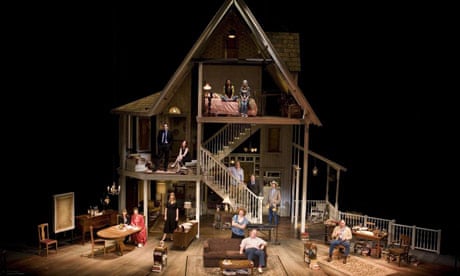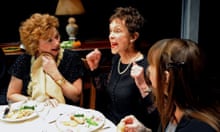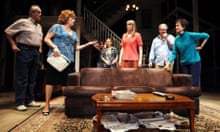Sam Shepard, the American playwright, when asked why he wrote so much about family, answered: 'What else is there?' Tracy Letts likes to borrow the quote, and it is easy to see why. Letts is the author of August: Osage County, an epic tragicomedy about family that has taken America by storm. His new play is the feted youngest member of American drama's extended, dysfunctional family - a natural heir (or, perhaps, wayward stepchild) to Tennessee Williams, Edward Albee and Eugene O'Neill. Steppenwolf's production first triumphed in its Chicago hometown, and then on Broadway (where serious work is often drowned out by the sound of musicals), and went on to capture the 2008 Pulitzer Prize, five Tony awards and the nation's imagination. Rachel Weisz described seeing it as one of her 'top 10 nights in the theatre ever'. Tracey Ullman told Deanna Dunagan, the actress who plays Violet - the bitter, addicted matriarch at the centre of the family web - that she recognised her own mother in Dunagan's performance. And Patrick Stewart paid the cast the awkward compliment of leaving after the first act because he found it too close to home (he promises to return). A film adaptation - with the Weinstein company - is now planned. But it is not just celebrities that are hooked. Family as a subject speaks to everyone - especially when pain and laughter collide.
This week the show opens at the National Theatre in London. And it seems incredible that Steppenwolf have not been seen in the capital since their stunning, sell-out adaptation of The Grapes of Wrath in 1989. The Chicago company first flared into life in the mid-Seventies. Its founders helped themselves - rather cheekily - to the title of Hermann Hesse's novel (even though no one had actually read Steppenwolf). But the name appealed: it sounded arresting, original, bold - and Steppenwolf was all these things. The founders were three boys barely out of school: Gary Sinise, Jeff Perry and Terry Kinney. They had energy, nerve and style. And the company, although peripatetic for years, became renowned for its risk-taking and up-front ferocity. This was where John Malkovich, John Mahoney and Joan Allen started their careers -and many other Steppenwolf stars have blown from the windy city to New York and Hollywood. Yet the company has always commanded loyalty and first-rate actors who wanted to stay on. Their return to London is an event in itself.
Before meeting the cast, I rang Tracy Letts in Chicago to ask about the family tree that inspired his play. Letts is 43 and has been an actor and Steppenwolf member since 2002. He is the author of several smaller-scale pieces (including Killer Joe and Bug - defined by one critic as 'trailer park noir'). Letts told me about the suicide of his maternal grandfather - a labourer who drowned in a lake. It's a story that has haunted Letts all his life. 'His death has always been a mystery and not one I remotely solve.' Instead, his grandfather's suicide exists in the play as the question from which everything else follows. His wife, Violet, is based on Letts's grandmother who became an addict after her husband's death. (Letts himself, more than a decade ago, battled with alcohol and drug addiction.)
He grew up in Oklahoma and does not regard his own family as having been unhappy. His mother, Billie, is a novelist; his father, Dennis, was a literature professor. And it is his relationship with his father that is key to understanding him and the production. Steppenwolf boldly cast Tracy's father (who had, extraordinarily enough, taken on a second career as an actor) in the role of grandfather. He played in Chicago to great acclaim before briefly transferring to Broadway. But in November 2007 he was diagnosed with lung cancer. He left the show in January, died in February. He was 73. Dennis had believed absolutely in his son's play but never lived to see its laurels. For Tracy, this was devastating. The overlap between what was happening on stage and the drama of losing his father was 'the most emotionally powerful thing of my life'. On the night of the Pulitzer ceremony, he could not feel conventionally celebratory. Instead he was overtaken by a rage he could neither subdue nor explain. 'It was complicated. As my shrink said: we're not wind-up dolls. I could not access the feelings I was supposed to feel.'
Letts has a highly developed emotional intelligence. In particular - and it is what makes his play powerful - he understands the force of what is not being said. It is difficult to feel to order - expecting an emotion may make it take flight. He expected his mother to be upset by his portrait of her mother - and she was. But he could never have predicted her verdict: 'You have been very kind to her,' she said. His mother seems to have a way of finding the right thing to say. Apparently - I gathered later from a cast member - she offered her son, after his father's death, the thought that for Dennis, his involvement in the play was 'the cherry on top of the sundae'. She told Tracy: 'Your Dad could not have picked a better last chapter.'
The cast of characters
I met the actors on their first day in London - jet-lagged but buoyant. I had decided to pick half a dozen key family members (the cast is 13-strong) and ask each of them to begin by talking in character, to make it possible not only to ask personal questions but to reveal exactly how dysfunctional this American family is. The poky interview room at the National came perfectly equipped - with a couch.
Jeff Perry
Actor, teacher, co-founder of Steppenwolf. He plays Bill Fordham, a married professor in his fifties having an affair with a student half his age. Perry is delightful yet distrait, with a way of holding one hand up like a traffic policeman, hoping to halt or redirect his thoughts.
'I am Bill Fordham. When challenged, I defend myself with verbal analysis. My marriage is in dire trouble. I am on the second half of the mortal merry-go-round. My wife does not understand, accept or particularly like my hard-wiring. I look forward to hitting the refresh button in my new relationship.' This makes unpleasant listening because Perry's Bill entirely lacks remorse. I banish him, with relief, in order to ask Perry about the company he co-founded in 1976. He is thrilled, he says, that Steppenwolf now has, in Letts, a writer of international stature. And he explains that Steppenwolf has always been defined by its ensemble work: 'We made a religion of communication between ourselves as actors. That has been the unchanging way in which we have measured our success and failure.'
Amy Morton
Actor, director and Steppenwolf member since 1997. She has been in many of the company's productions, including One Flew Over the Cuckoo's Nest. Morton plays Bill's estranged wife. She is an angular beauty and in every way sympathetic but, in character, talks with injured defiance.
'I am Barbara Fordham. I am 47. My qualities are my sense of humour. Loyalty. Passion. Yes - passion. It goes into my anger. My marriage is challenging but I am not to blame. I am not the one who left for someone younger. Bill won't talk to me. I am more than willing to talk to him. My daughter's drug problem? You'll have to talk to her father about it.'
What has it been like to play Barbara? 'There are days when you'd rather peel the skin off your face than go on stage,' Morton says. After a recent rehearsal: 'I went home in an edgy, foul humour and realised: "Oh, right, it's her." She is very frustrated, angry and sad. The older you get as an actor, the less you bring it home, but if you do a role for more than a year, it's going to take its psychic toll.' She admits: 'I feel this character in my bones.'
Molly Ranson
Making her professional debut. She plays troubled, 14-year-old, dope-smoking Jean - Bill and Barbara's daughter. Ranson, unlike her character, is full of shining optimism.
'I have just found out Dad is sleeping with one of his students. Recently, Mum hasn't been there for me, nor has Dad. It all happened suddenly: we were happy, then my grandfather went missing. When did I start smoking pot? During 8th grade.'
Jean represents family history - the addictive gene - repeating itself. Her 'inability to face reality,' Ranson suggests, is 'representative of many Americans'. She likens the play to 'watching a car accident. You feel you shouldn't be there but you can't look away.' The humour is 'real, terrifying and dark'.
Deanna Dunagan
Won a Tony award, among others, for her performance as Violet Weston. Has been in eight Steppenwolf productions. Dunagan is poised, eloquent and diffident. In character, she is unnervingly deluded, unable to face up to being an addict. And she reminds us how often family is about front.
'I am Violet. I am 67. I have to take many pills - but I don't agree that I have a problem. I have a bad back and knees. I am a survivor. I have been a good mother. I love my girls. Barbara left - she just left. In my day, families stayed together. Barbara is quite smart. Ivy, my daughter who stayed at home, could find a good husband. Karen - has gone away. Regrets? I wish I had been able to make a mark in the world. But my girls are good people and that is an achievement.'
Dunagan believes that audiences want to 'find the key to how to live in a family. There will always be problems. Even if you love each other deeply. You'll be hurt. It's inevitable. Everyone comes to the theatre hungry to see another family's pain.'
Rondi Reed
Member of Steppenwolf since 1979. Has appeared in more than 60 company productions. She won a Tony as Mattie Fae. Reed is ebullient, warm, with a jesting energy.
'I am Mattie Fae, Violet's sister. I am 57. I am gregarious and sexy for my age. I am a goer, a doer, an organiser. I am well provided for by my husband in the upholstery business and I'm upholstered in every sense - always fighting my weight. I have a wonderful sense of humour. But my son is a trial to me. My sister is having big problems. Do I have faults? I like too many sweet things. I probably give people too many chances.'
Reed laughs, exclaiming at how similar she and Mattie Fae are. That's not surprising: the part was written for her.
Kimberly Guerrero
Plays the Native American servant. She grew up near Pawhuska, Oklahoma, where the play is set. TV appearances include The Sopranos. Guerrero has an uplifting spirit and pride in her role.
'I am Johnna. Some people think Native Americans no longer exist, or that we are inarticulate. My role is to embrace the compassion and wisdom of my culture. Native Americans see death as not so far from the beauty of birth - as its photo-negative. We don't look at life as linear, we see it as a circle.'
Letts has described his play as a 'political parable' - a portrait of America. It is no coincidence, as Amy Morton points out, that the play begins (and ends) with a Native American. Morton believes the play reflects the 'mess of the American story and the beauty of it'. Rondi Reed sees the play as being about addiction and a 'toxicity that has pervaded the American psyche'. As a cast of Democrats, they all felt that if John McCain had won the US presidential election, the play would have had a 'sadder reception'. But, as Deanna Dunagan asserts: 'Since Obama has been elected, everything has changed. We were all so embarrassed, depressed, fearful and disgusted with what was happening in our country. Now there is hope. It is astonishing what one day can do in the life of a nation.' And it changes the way they feel about coming to London. Rondi explains: 'It makes us come here with our heads held high, as opposed to slinking through the back door.'



